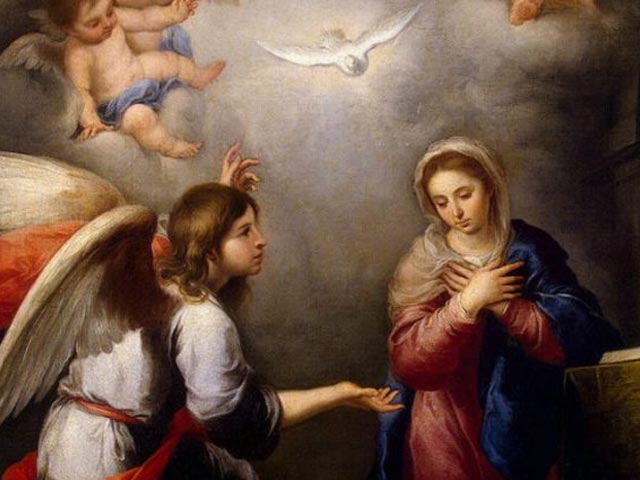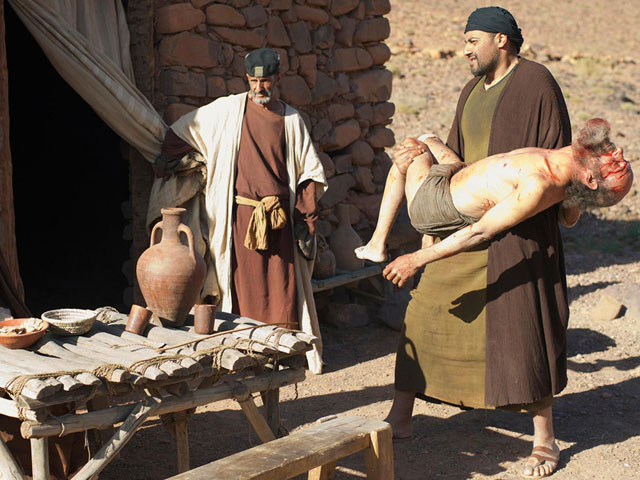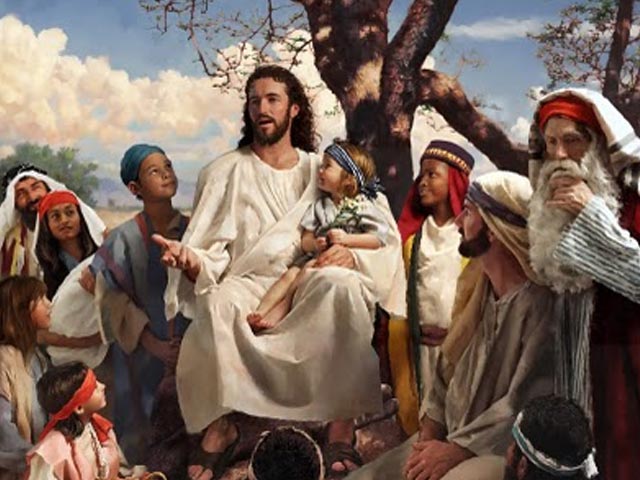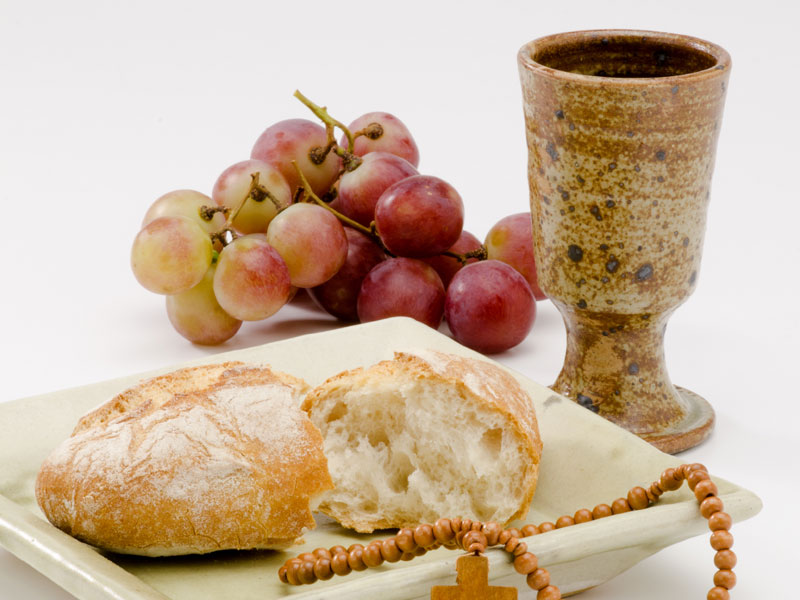Daily Readings Audio | Daily Meditation | March 8, 2021 – March 14, 2021
March 8, 2021
Nghe các bài đọc Anh Ngữ tại đây ⇒ LISTEN PODCAST
Monday of the Third Week of Lent
Lectionary: 237

DAILY MEDITATION
by Daily reading & meditation website
Nghe đọc, Click vào đây
Opt. Mem. Saint John of God, Religious
In the first reading, the prophet Elisha instructs Naaman, an Aramean (Syrian) army commander, and also a leper, to wash seven times in the Jordan and his flesh would be healed. In the Gospel, Jesus speaks at the synagogue in Nazareth. He refers to the story of Naaman and other non- Jews healed by prophets to show the many times throughout history that prophets have been rejected by their own people. These words elicit violent fury, but Jesus escapes unharmed.
We are invited to be open to God’s actions, even when they don’t fit our expectations. In today’s readings, we are reminded that God sometimes works in unexpected ways, ways that contradict our expectations. We can respond to God’s actions as the people of Nazareth did and reject what God is doing, or be open to the possibility that God can indeed be working in this surprising way, as Naaman was. Let us choose openness. Let us pray for those of us gathered here, may the Lord bless us in our Lenten journey. Amen.
Reading I
Naaman, the army commander of the king of Aram,
was highly esteemed and respected by his master,
for through him the LORD had brought victory to Aram.
But valiant as he was, the man was a leper.
Now the Arameans had captured in a raid on the land of Israel
a little girl, who became the servant of Naaman’s wife.
“If only my master would present himself to the prophet in Samaria,”
she said to her mistress, “he would cure him of his leprosy.”
Naaman went and told his lord
just what the slave girl from the land of Israel had said.
“Go,” said the king of Aram.
“I will send along a letter to the king of Israel.”
So Naaman set out, taking along ten silver talents,
six thousand gold pieces, and ten festal garments.
To the king of Israel he brought the letter, which read:
“With this letter I am sending my servant Naaman to you,
that you may cure him of his leprosy.”
When he read the letter,
the king of Israel tore his garments and exclaimed:
“Am I a god with power over life and death,
that this man should send someone to me to be cured of leprosy?
Take note! You can see he is only looking for a quarrel with me!”
When Elisha, the man of God,
heard that the king of Israel had torn his garments,
he sent word to the king:
“Why have you torn your garments?
Let him come to me and find out
that there is a prophet in Israel.”
Naaman came with his horses and chariots
and stopped at the door of Elisha’s house.
The prophet sent him the message:
“Go and wash seven times in the Jordan,
and your flesh will heal, and you will be clean.”
But Naaman went away angry, saying,
“I thought that he would surely come out and stand there
to invoke the LORD his God,
and would move his hand over the spot,
and thus cure the leprosy.
Are not the rivers of Damascus, the Abana and the Pharpar,
better than all the waters of Israel?
Could I not wash in them and be cleansed?”
With this, he turned about in anger and left.
But his servants came up and reasoned with him.
“My father,” they said,
“if the prophet had told you to do something extraordinary,
would you not have done it?
All the more now, since he said to you,
‘Wash and be clean,’ should you do as he said.”
So Naaman went down and plunged into the Jordan seven times
at the word of the man of God.
His flesh became again like the flesh of a little child, and he was clean.
He returned with his whole retinue to the man of God.
On his arrival he stood before him and said,
“Now I know that there is no God in all the earth,
except in Israel.”
Responsorial Psalm
R. (see 42:3) Athirst is my soul for the living God.
When shall I go and behold the face of God?
As the hind longs for the running waters,
so my soul longs for you, O God.
R. Athirst is my soul for the living God.
When shall I go and behold the face of God?
Athirst is my soul for God, the living God.
When shall I go and behold the face of God?
R. Athirst is my soul for the living God.
When shall I go and behold the face of God?
Send forth your light and your fidelity;
they shall lead me on
And bring me to your holy mountain,
to your dwelling-place.
R. Athirst is my soul for the living God.
When shall I go and behold the face of God?
Then will I go in to the altar of God,
the God of my gladness and joy;
Then will I give you thanks upon the harp,
O God, my God!
R. Athirst is my soul for the living God.
When shall I go and behold the face of God?
Verse before the Gospel
I hope in the LORD, I trust in his word;
with him there is kindness and plenteous redemption.
Gospel
Jesus said to the people in the synagogue at Nazareth:
“Amen, I say to you,
no prophet is accepted in his own native place.
Indeed, I tell you, there were many widows in Israel
in the days of Elijah
when the sky was closed for three and a half years
and a severe famine spread over the entire land.
It was to none of these that Elijah was sent,
but only to a widow in Zarephath in the land of Sidon.
Again, there were many lepers in Israel
during the time of Elisha the prophet;
yet not one of them was cleansed, but only Naaman the Syrian.”
When the people in the synagogue heard this,
they were all filled with fury.
They rose up, drove him out of the town,
and led him to the brow of the hill
on which their town had been built,
to hurl him down headlong.
But he passed through the midst of them and went away.
- Readings for the Optional Memorial of Saint John of God, religious
March 9, 2021
Nghe các bài đọc Anh Ngữ tại đây ⇒ LISTEN PODCAST
Tuesday of the Third Week of Lent
Lectionary: 238

DAILY MEDITATION
by Daily reading & meditation website
Nghe đọc, Click vào đây
Opt. Mem. Saint Frances of Rome, Religious
In the first reading, Azariah prays to God from the fiery furnace, begging God to receive Israel’s contrite heart and to deliver them from shame. In the Gospel, Jesus tells the parable of the unforgiving servant, and says, my heavenly Father also will not forgive those who refuse to forgive others.
As we have been forgiven, so must we be forgiving. Lent is a journey of shared forgiveness between us and God and one another. As we have been forgiven, so must we be forgiving. When in desperation we come to know the great gift of forgiveness, given so freely by God, our softened hearts will, in turn, freely share it with others. Let us pray for the mercies of God may inspire forgiveness and reconciliation among nations. Amen.
Reading I
Azariah stood up in the fire and prayed aloud:
“For your name’s sake, O Lord, do not deliver us up forever,
or make void your covenant.
Do not take away your mercy from us,
for the sake of Abraham, your beloved,
Isaac your servant, and Israel your holy one,
To whom you promised to multiply their offspring
like the stars of heaven,
or the sand on the shore of the sea.
For we are reduced, O Lord, beyond any other nation,
brought low everywhere in the world this day
because of our sins.
We have in our day no prince, prophet, or leader,
no burnt offering, sacrifice, oblation, or incense,
no place to offer first fruits, to find favor with you.
But with contrite heart and humble spirit
let us be received;
As though it were burnt offerings of rams and bullocks,
or thousands of fat lambs,
So let our sacrifice be in your presence today
as we follow you unreservedly;
for those who trust in you cannot be put to shame.
And now we follow you with our whole heart,
we fear you and we pray to you.
Do not let us be put to shame,
but deal with us in your kindness and great mercy.
Deliver us by your wonders,
and bring glory to your name, O Lord.”
Responsorial Psalm
R. (6a) Remember your mercies, O Lord.
Your ways, O LORD, make known to me;
teach me your paths,
Guide me in your truth and teach me,
for you are God my savior.
R. Remember your mercies, O Lord.
Remember that your compassion, O LORD,
and your kindness are from of old.
In your kindness remember me,
because of your goodness, O LORD.
R. Remember your mercies, O Lord.
Good and upright is the LORD;
thus he shows sinners the way.
He guides the humble to justice,
he teaches the humble his way.
R. Remember your mercies, O Lord.
Verse before the Gospel
Even now, says the LORD,
return to me with your whole heart;
for I am gracious and merciful.
Gospel
Peter approached Jesus and asked him,
“Lord, if my brother sins against me,
how often must I forgive him?
As many as seven times?”
Jesus answered, “I say to you, not seven times but seventy-seven times.
That is why the Kingdom of heaven may be likened to a king
who decided to settle accounts with his servants.
When he began the accounting,
a debtor was brought before him who owed him a huge amount.
Since he had no way of paying it back,
his master ordered him to be sold,
along with his wife, his children, and all his property,
in payment of the debt.
At that, the servant fell down, did him homage, and said,
‘Be patient with me, and I will pay you back in full.’
Moved with compassion the master of that servant
let him go and forgave him the loan.
When that servant had left, he found one of his fellow servants
who owed him a much smaller amount.
He seized him and started to choke him, demanding,
‘Pay back what you owe.’
Falling to his knees, his fellow servant begged him,
‘Be patient with me, and I will pay you back.’
But he refused.
Instead, he had him put in prison
until he paid back the debt.
Now when his fellow servants saw what had happened,
they were deeply disturbed, and went to their master
and reported the whole affair.
His master summoned him and said to him, ‘You wicked servant!
I forgave you your entire debt because you begged me to.
Should you not have had pity on your fellow servant,
as I had pity on you?’
Then in anger his master handed him over to the torturers
until he should pay back the whole debt.
So will my heavenly Father do to you,
unless each of you forgives your brother from your heart.”
- Readings for the Optional Memorial of Saint Frances of Rome, religious
March 10, 2021
Nghe các bài đọc Anh Ngữ tại đây ⇒ LISTEN PODCAST
Wednesday of the Third Week of Lent
Lectionary: 239
DAILY MEDITATION
by Daily reading & meditation website
Nghe đọc, Click vào đây
Moses instructs the people to observe the statutes and decrees of the Lord as they enter the land the Lord is giving them. In the Gospel, Jesus says that he did not come to abolish the law but to fulfill it. Whoever obeys and teaches these commandments will be called greatest in the Kingdom of heaven. Moses encourages the people to observe God’s law; Jesus says he has come to fulfill it.
Near the end of his life, Moses calls the people to remain faithful to God’s laws. If they are faithful, he promises that God will reward them. Jesus also speaks of the importance of following the law, but he calls us to a deeper understanding of what the law requires of us. Let us pray for all who have died, may they soon come to find their resting place in God’s kingdom. Amen.
Reading I
Moses spoke to the people and said:
“Now, Israel, hear the statutes and decrees
which I am teaching you to observe,
that you may live, and may enter in and take possession of the land
which the LORD, the God of your fathers, is giving you.
Therefore, I teach you the statutes and decrees
as the LORD, my God, has commanded me,
that you may observe them in the land you are entering to occupy.
Observe them carefully,
for thus will you give evidence
of your wisdom and intelligence to the nations,
who will hear of all these statutes and say,
‘This great nation is truly a wise and intelligent people.’
For what great nation is there
that has gods so close to it as the LORD, our God, is to us
whenever we call upon him?
Or what great nation has statutes and decrees
that are as just as this whole law
which I am setting before you today?
“However, take care and be earnestly on your guard
not to forget the things which your own eyes have seen,
nor let them slip from your memory as long as you live,
but teach them to your children and to your children’s children.”
Responsorial Psalm
R. (12a) Praise the Lord, Jerusalem.
Glorify the LORD, O Jerusalem;
praise your God, O Zion.
For he has strengthened the bars of your gates;
he has blessed your children within you.
R. Praise the Lord, Jerusalem.
He sends forth his command to the earth;
swiftly runs his word!
He spreads snow like wool;
frost he strews like ashes.
R. Praise the Lord, Jerusalem.
He has proclaimed his word to Jacob,
his statutes and his ordinances to Israel.
He has not done thus for any other nation;
his ordinances he has not made known to them.
R. Praise the Lord, Jerusalem.
Verse before the Gospel
Your words, Lord, are Spirit and life;
you have the words of everlasting life.
Gospel
Jesus said to his disciples:
“Do not think that I have come to abolish the law or the prophets.
I have come not to abolish but to fulfill.
Amen, I say to you, until heaven and earth pass away,
not the smallest letter or the smallest part of a letter
will pass from the law,
until all things have taken place.
Therefore, whoever breaks one of the least of these commandments
and teaches others to do so
will be called least in the Kingdom of heaven.
But whoever obeys and teaches these commandments
will be called greatest in the Kingdom of heaven.”
March 11, 2021
Nghe các bài đọc Anh Ngữ tại đây ⇒ LISTEN PODCAST
Thursday of the Third Week of Lent
Lectionary: 240
DAILY MEDITATION
by Daily reading & meditation website
Nghe đọc, Click vào đây
In the first reading, the Lord gives Jeremiah a sobering truth, and warning: God’s prophets have always faced stubbornness and hostility from the people for speaking the truth, and Jeremiah’s experience will be no different. In the Gospel, Jesus says that it is by God’s power that he drives out demons, and whoever is not with [him] is against [him].
Whoever is not with me is against me. Humanity has often turned its back on God, doubting and preferring its own path to God’s way. We of the present day share that with the people in Jesus’ time, as well as the exiles of Jeremiah’s day. If we turn to Christ, his grace is stronger than the demon with the toughest grip on our lives. Let us pray for people, may Christ crucified draw them close to himself in their time of suffering. Amen.
Reading I
Thus says the LORD:
This is what I commanded my people:
Listen to my voice;
then I will be your God and you shall be my people.
Walk in all the ways that I command you,
so that you may prosper.
But they obeyed not, nor did they pay heed.
They walked in the hardness of their evil hearts
and turned their backs, not their faces, to me.
From the day that your fathers left the land of Egypt even to this day,
I have sent you untiringly all my servants the prophets.
Yet they have not obeyed me nor paid heed;
they have stiffened their necks and done worse than their fathers.
When you speak all these words to them,
they will not listen to you either;
when you call to them, they will not answer you.
Say to them:
This is the nation that does not listen
to the voice of the LORD, its God,
or take correction.
Faithfulness has disappeared;
the word itself is banished from their speech.
Responsorial Psalm
R. (8) If today you hear his voice, harden not your hearts.
Come, let us sing joyfully to the LORD;
let us acclaim the Rock of our salvation.
Let us come into his presence with thanksgiving;
let us joyfully sing psalms to him.
R. If today you hear his voice, harden not your hearts.
Come, let us bow down in worship;
let us kneel before the LORD who made us.
For he is our God,
and we are the people he shepherds, the flock he guides.
R. If today you hear his voice, harden not your hearts.
Oh, that today you would hear his voice:
“Harden not your hearts as at Meribah,
as in the day of Massah in the desert,
Where your fathers tempted me;
they tested me though they had seen my works.”
R. If today you hear his voice, harden not your hearts.
Verse before the Gospel
Even now, says the LORD,
return to me with your whole heart,
for I am gracious and merciful.
Gospel
Jesus was driving out a demon that was mute,
and when the demon had gone out,
the mute man spoke and the crowds were amazed.
Some of them said, “By the power of Beelzebul, the prince of demons,
he drives out demons.”
Others, to test him, asked him for a sign from heaven.
But he knew their thoughts and said to them,
“Every kingdom divided against itself will be laid waste
and house will fall against house.
And if Satan is divided against himself,
how will his kingdom stand?
For you say that it is by Beelzebul that I drive out demons.
If I, then, drive out demons by Beelzebul,
by whom do your own people drive them out?
Therefore they will be your judges.
But if it is by the finger of God that I drive out demons,
then the Kingdom of God has come upon you.
When a strong man fully armed guards his palace,
his possessions are safe.
But when one stronger than he attacks and overcomes him,
he takes away the armor on which he relied
and distributes the spoils.
Whoever is not with me is against me,
and whoever does not gather with me scatters.”
March 12, 2021
Nghe các bài đọc Anh Ngữ tại đây ⇒ LISTEN PODCAST
Friday of the Third Week of Lent
Lectionary: 241
DAILY MEDITATION
by Daily reading & meditation website
Nghe đọc, Click vào đây
The prophet Hosea calls Israel to return to the Lord, and ask for pardon. In turn, the Lord will heal their defection. Jesus answers a scribe’s question in today’s Gospel, saying the greatest commandment is to love God with your whole heart, soul, mind, and strength, and to love your neighbor as yourself.
Jesus tells us the greatest commandment is to love God with our total being and to love our neighbor as ourselves. Today’s readings are about love. We are called to love God with our whole being and to love our neighbor. This requires us to put God and others above our own wants and needs. Let us, in prayer, ask God each day for the grace to continually grow in our love for him and for others. Let us pray for members of this community, may the Holy Spirit enkindle in us a spirit of joy for the gift of our faith. Amen.
Reading I
Thus says the LORD:
Return, O Israel, to the LORD, your God;
you have collapsed through your guilt.
Take with you words,
and return to the LORD;
Say to him, “Forgive all iniquity,
and receive what is good, that we may render
as offerings the bullocks from our stalls.
Assyria will not save us,
nor shall we have horses to mount;
We shall say no more, ‘Our god,’
to the work of our hands;
for in you the orphan finds compassion.”
I will heal their defection, says the LORD,
I will love them freely;
for my wrath is turned away from them.
I will be like the dew for Israel:
he shall blossom like the lily;
He shall strike root like the Lebanon cedar,
and put forth his shoots.
His splendor shall be like the olive tree
and his fragrance like the Lebanon cedar.
Again they shall dwell in his shade
and raise grain;
They shall blossom like the vine,
and his fame shall be like the wine of Lebanon.
Ephraim! What more has he to do with idols?
I have humbled him, but I will prosper him.
“I am like a verdant cypress tree”–
Because of me you bear fruit!
Let him who is wise understand these things;
let him who is prudent know them.
Straight are the paths of the LORD,
in them the just walk,
but sinners stumble in them.
Responsorial Psalm
81:6c-8a, 8bc-9, 10-11ab, 14 and 17
R. (see 11 and 9a) I am the Lord your God: hear my voice.
An unfamiliar speech I hear:
“I relieved his shoulder of the burden;
his hands were freed from the basket.
In distress you called, and I rescued you.”
R. I am the Lord your God: hear my voice.
“Unseen, I answered you in thunder;
I tested you at the waters of Meribah.
Hear, my people, and I will admonish you;
O Israel, will you not hear me?”
R. I am the Lord your God: hear my voice.
“There shall be no strange god among you
nor shall you worship any alien god.
I, the LORD, am your God
who led you forth from the land of Egypt.”
R. I am the Lord your God: hear my voice.
“If only my people would hear me,
and Israel walk in my ways,
I would feed them with the best of wheat,
and with honey from the rock I would fill them.”
R. I am the Lord your God: hear my voice.
Verse before the Gospel
Repent, says the Lord;
the Kingdom of heaven is at hand.
Gospel
One of the scribes came to Jesus and asked him,
“Which is the first of all the commandments?”
Jesus replied, “The first is this:
Hear, O Israel!
The Lord our God is Lord alone!
You shall love the Lord your God with all your heart,
with all your soul,
with all your mind,
and with all your strength.
The second is this:
You shall love your neighbor as yourself.
There is no other commandment greater than these.”
The scribe said to him, “Well said, teacher.
You are right in saying,
He is One and there is no other than he.
And to love him with all your heart,
with all your understanding,
with all your strength,
and to love your neighbor as yourself
is worth more than all burnt offerings and sacrifices.”
And when Jesus saw that he answered with understanding,
he said to him,
“You are not far from the Kingdom of God.”
And no one dared to ask him any more questions.
March 13, 2021
Nghe các bài đọc Anh Ngữ tại đây ⇒ LISTEN PODCAST
Saturday of the Third Week of Lent
Lectionary: 242
DAILY MEDITATION
by Daily reading & meditation website
Nghe đọc, Click vào đây
In the first reading, Hosea tells the people to return to the Lord, who calls for love and knowledge of God rather than sacrifice and burn offerings. In the Gospel, Jesus tells the parable of a Pharisee and tax collector who go to pray in the temple area. The tax collector was justified in his humility, while the Pharisee, in exalting himself, was not.
God calls us to deeper love and knowledge of him through our Lenten practices. God desires our love and wants us to know his love for us. He invites us to be humble and accept his mercy so that he may heal us and bind up our wounds. Our Lenten prayer, fasting, and almsgiving are empty offerings if they are done without humility and the desire to know and love God more. Let us pray for all who are in need of healing may be consoled by God’s love and compassion. Amen.
Reading I
“Come, let us return to the LORD,
it is he who has rent, but he will heal us;
he has struck us, but he will bind our wounds.
He will revive us after two days;
on the third day he will raise us up,
to live in his presence.
Let us know, let us strive to know the LORD;
as certain as the dawn is his coming,
and his judgment shines forth like the light of day!
He will come to us like the rain,
like spring rain that waters the earth.”
What can I do with you, Ephraim?
What can I do with you, Judah?
Your piety is like a morning cloud,
like the dew that early passes away.
For this reason I smote them through the prophets,
I slew them by the words of my mouth;
For it is love that I desire, not sacrifice,
and knowledge of God rather than burnt offerings.
Responsorial Psalm
R. (see Hosea 6:6) It is mercy I desire, and not sacrifice.
Have mercy on me, O God, in your goodness;
in the greatness of your compassion wipe out my offense.
Thoroughly wash me from my guilt
and of my sin cleanse me.
R. It is mercy I desire, and not sacrifice.
For you are not pleased with sacrifices;
should I offer a burnt offering, you would not accept it.
My sacrifice, O God, is a contrite spirit;
a heart contrite and humbled, O God, you will not spurn.
R. It is mercy I desire, and not sacrifice.
Be bountiful, O LORD, to Zion in your kindness
by rebuilding the walls of Jerusalem;
Then shall you be pleased with due sacrifices,
burnt offerings and holocausts.
R. It is mercy I desire, and not sacrifice.
Verse before the Gospel
If today you hear his voice,
harden not your hearts.
Gospel
Jesus addressed this parable
to those who were convinced of their own righteousness
and despised everyone else.
“Two people went up to the temple area to pray;
one was a Pharisee and the other was a tax collector.
The Pharisee took up his position and spoke this prayer to himself,
‘O God, I thank you that I am not like the rest of humanity —
greedy, dishonest, adulterous — or even like this tax collector.
I fast twice a week,
and I pay tithes on my whole income.’
But the tax collector stood off at a distance
and would not even raise his eyes to heaven
but beat his breast and prayed,
‘O God, be merciful to me a sinner.’
I tell you, the latter went home justified, not the former;
for everyone who exalts himself will be humbled,
and the one who humbles himself will be exalted.”
March 14, 2021
Nghe các bài đọc Anh Ngữ tại đây ⇒ LISTEN PODCAST
Fourth Sunday of Lent | Year B
Lectionary: 32
DAILY MEDITATION
by Daily reading & meditation website
Nghe đọc, Click vào đây
The first reading recounts the failure of God’s people to listen to his prophets and repent. Their wickedness results in their ruin and exile to Babylon. In the second reading, Paul tells the Ephesians they are saved by grace through faith, which is a gift from God. In the Gospel, Jesus tells Nicodemus that God sent his Son into the world, not to condemn it, but to save it. God sent Christ into the world not to condemn, but to save and to heal.
Throughout history, humans have had a tendency to choose what is the easier – but not necessarily the better – path. The easier path often leads away from God and into the darkness of sin. Christ’s way is the way of light. We are called to be his disciples, to let go of preferences and actions which keep us in the dark, and to take the path which leads to truth and goodness. Let us pray for the leaders of the Church, may Christ, the source of their wisdom, strengthen their hearts as they teach God’s law in our world. Amen.
Reading I
In those days, all the princes of Judah, the priests, and the people
added infidelity to infidelity,
practicing all the abominations of the nations
and polluting the LORD’s temple
which he had consecrated in Jerusalem.
Early and often did the LORD, the God of their fathers,
send his messengers to them,
for he had compassion on his people and his dwelling place.
But they mocked the messengers of God,
despised his warnings, and scoffed at his prophets,
until the anger of the LORD against his people was so inflamed
that there was no remedy.
Their enemies burnt the house of God,
tore down the walls of Jerusalem,
set all its palaces afire,
and destroyed all its precious objects.
Those who escaped the sword were carried captive to Babylon,
where they became servants of the king of the Chaldeans and his sons
until the kingdom of the Persians came to power.
All this was to fulfill the word of the LORD spoken by Jeremiah:
“Until the land has retrieved its lost sabbaths,
during all the time it lies waste it shall have rest
while seventy years are fulfilled.”
In the first year of Cyrus, king of Persia,
in order to fulfill the word of the LORD spoken by Jeremiah,
the LORD inspired King Cyrus of Persia
to issue this proclamation throughout his kingdom,
both by word of mouth and in writing:
“Thus says Cyrus, king of Persia:
All the kingdoms of the earth
the LORD, the God of heaven, has given to me,
and he has also charged me to build him a house
in Jerusalem, which is in Judah.
Whoever, therefore, among you belongs to any part of his people,
let him go up, and may his God be with him!”
Responsorial Psalm
R. (6ab) Let my tongue be silenced, if I ever forget you!
By the streams of Babylon
we sat and wept
when we remembered Zion.
On the aspens of that land
we hung up our harps.
R. Let my tongue be silenced, if I ever forget you!
For there our captors asked of us
the lyrics of our songs,
And our despoilers urged us to be joyous:
“Sing for us the songs of Zion!”
R. Let my tongue be silenced, if I ever forget you!
How could we sing a song of the LORD
in a foreign land?
If I forget you, Jerusalem,
may my right hand be forgotten!
R. Let my tongue be silenced, if I ever forget you!
May my tongue cleave to my palate
if I remember you not,
If I place not Jerusalem
ahead of my joy.
R. Let my tongue be silenced, if I ever forget you!
Reading II
Brothers and sisters:
God, who is rich in mercy,
because of the great love he had for us,
even when we were dead in our transgressions,
brought us to life with Christ — by grace you have been saved —,
raised us up with him,
and seated us with him in the heavens in Christ Jesus,
that in the ages to come
He might show the immeasurable riches of his grace
in his kindness to us in Christ Jesus.
For by grace you have been saved through faith,
and this is not from you; it is the gift of God;
it is not from works, so no one may boast.
For we are his handiwork, created in Christ Jesus for the good works
that God has prepared in advance,
that we should live in them
Verse Before the Gospel
God so loved the world that he gave his only Son,
so everyone who believes in him might have eternal life.
Gospel
Jesus said to Nicodemus:
“Just as Moses lifted up the serpent in the desert,
so must the Son of Man be lifted up,
so that everyone who believes in him may have eternal life.”
For God so loved the world that he gave his only Son,
so that everyone who believes in him might not perish
but might have eternal life.
For God did not send his Son into the world to condemn the world,
but that the world might be saved through him.
Whoever believes in him will not be condemned,
but whoever does not believe has already been condemned,
because he has not believed in the name of the only Son of God.
And this is the verdict,
that the light came into the world,
but people preferred darkness to light,
because their works were evil.
For everyone who does wicked things hates the light
and does not come toward the light,
so that his works might not be exposed.
But whoever lives the truth comes to the light,
so that his works may be clearly seen as done in God.

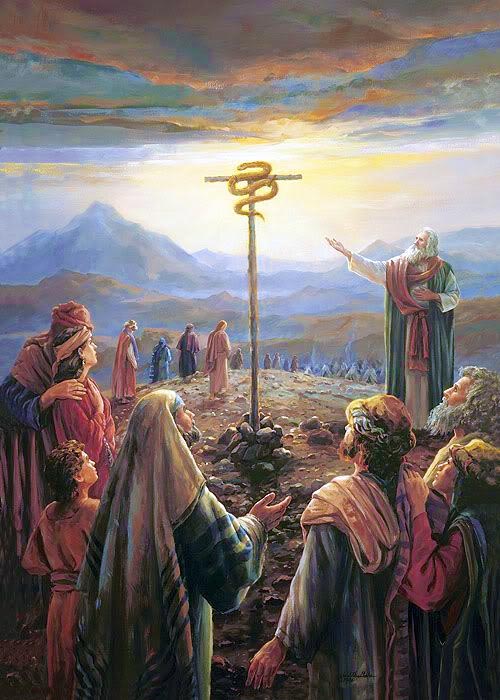 Jn 3:14-21
Jn 3:14-21

